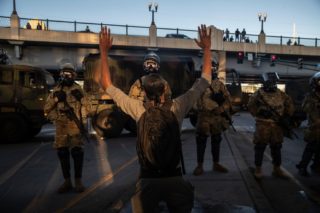JERUSALEM – LIKE MUCH of the fighting between Israel and the Palestinians, the latest spasm of violence began as a dispute over a small bit of land. In this case it was the sunken plaza and wide steps around Damascus Gate, one of the ancient entrances to the old walled city at the heart of Jerusalem. For the Palestinian residents of East Jerusalem (the part of the city that Israel occupied in 1967, including the walled city) the plaza is a gathering spot. During the Muslim holy month of Ramadan thousands come for coffee and sweets after breaking the day’s fast. “This is where we always played as kids,” says Udai Salam, a local stall-owner. “More importantly, this is the way to the al-Aqsa mosque [Islam’s third holiest shrine] and we won’t accept the Jews controlling it.”
So it was no surprise when the decision by Israel’s inexperienced police chief to fence off the area “for security reasons” at the start of Ramadan last month led to clashes. The move was later reversed, but tensions remained high. Recent street battles between young Palestinians and Israeli police culminated in two big incidents in which the police entered the area around al-Aqsa, firing stun-grenades and rubber bullets. Hundreds were injured. Then on May 10th Hamas, the Islamist movement that rules Gaza, fired more than 150 rockets towards Jerusalem and towns in southern Israel in retaliation for the “crimes and aggression” in the Holy City. Israel responded with air strikes on Gaza, which reportedly killed at least 20 people.
A case before Israel’s Supreme Court has added to the febrile atmosphere. In light of the violence the court postponed ruling on the possible eviction of some Palestinian families in the Sheikh Jarrah neighbourhood of East Jerusalem. The land on which their homes sit was owned by Jews before Jordan occupied the eastern part of Jerusalem in 1948. Jordan used it to resettle Palestinian refugees from the western part of the city, which had been taken by Israel. Under Israeli law the heirs of the original owners, as Israelis, can reclaim the property. The Palestinian families have no such rights over their former homes in West Jerusalem. In fact, all property once owned by “absentee” Palestinians was expropriated by Israel and can no longer be claimed by its original owners.
The Jewish settler organisations pursuing the evictions are connected to far-right groups that, under the banner of the “Religious Zionism” party, are represented in the Knesset (Israel’s parliament) and allied with Binyamin Netanyahu, the prime minister. They have taken to the streets in recent weeks, increasing the tension. On May 10th thousands of Jewish nationalists marched on “Jerusalem Day”—a holiday marking Israel’s capture of East Jerusalem, the West Bank and other territories in the six-day war in 1967. The annual march is seen by Palestinians as a provocation. This year, at least, Mr Netanyahu ordered a last-minute change to the route, away from Damascus Gate. That rankled the marchers, but just as they were gathering at the roadblock preventing their progress to the gate, Hamas launched its rockets, setting off air-raid sirens and forcing them to disperse.
Israel’s occupation of East Jerusalem is about to enter its 55th year. It claims to have “reunified” the city. But it remains irrevocably divided. Over a third of its population are Palestinians, most of whom have “residency” rights, which gives them access to Israeli social security and health care, but are not treated as equals to Israelis and face a variety of pressures to move out. Tens of thousands of Palestinians work in the Jewish, western part of the city, speaking Hebrew. Many study in Israeli universities. But they retain their Palestinian identity.
Israeli and Palestinian officials hoped the end of Ramadan later this week would calm the city. Israel’s spooks still think Hamas wants to avoid a conflict like the one in 2014 that lasted seven weeks and killed over 2,300 people, mostly Palestinians. Since then their confrontations have been shorter and less bloody. But Hamas was expecting to make big gains in the Palestinian parliamentary elections on May 22nd (the first such ballot in 15 years). Mahmoud Abbas, the Palestinian president and leader of Fatah, a rival party, indefinitely postponed the elections on April 29th, ostensibly because Israel won’t let some Palestinians vote at post offices in East Jerusalem. So Hamas may have decided to assert its leadership in other ways.
On the Israeli side, Mr Netanyahu is tired and distracted. He has fought four elections in two years, none of which has produced a conclusive result. His rivals are edging closer to a deal that will remove him from power and thus leave him little hope of curtailing his trial on corruption charges, at which witnesses recently began testifying. Were he in a stronger position, he might have done more to rein in the police and his far-right supporters. Soon those decisions might be made by someone else.
By The Economist





